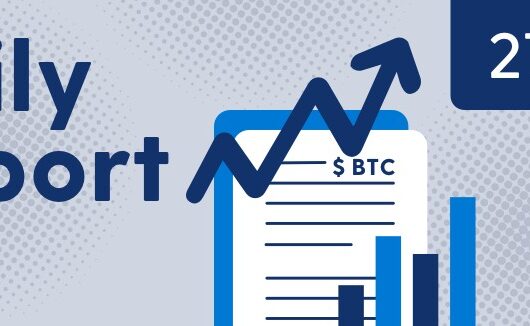2023 in Crypto: The top transformative developments

Last year was one of reflection and growth for the crypto space, especially as the industry rebuilt in the wake of FTX’s collapse at the end of 2022. The year end saw investors once again rally behind crypto, with bitcoin rising to $45,000 for the first time in two years amid a flurry of interest from major traditional institutions like BlackRock.
As we step fresh into the new year, here’s an in-depth look at the defining developments of 2023 that promise to shape the future of the industry.
Bitcoin spot-ETF pivot
The announcement of BlackRock’s application for a Bitcoin spot-ETF came in June 2023. With a dozen such applications pending SEC approval, industry giants await a landmark decision set to potentially match the impact of gold ETFs’ launch in 2003, which made investing in the asset easier for everyday investors around the world. The price of gold increased from around $300 pre-ETF to $1,900 in the following eight years.
“Bitcoin spot-ETF filings can be seen as the catalyst in driving this renewed confidence, signalling wider institutional interest in Bitcoin and the broader crypto market,” says Christo de Wit, South Africa Country Manager at Luno.
So? Anticipated as a gateway to greater bitcoin adoption, approval by the SEC could provide institutional investors a regulated avenue for bitcoin investment. However, a denial by the SEC could also cause ripples of uncertainty among investors.
– James Ovenden, Head of Product Marketing, Luno
“If the price movements we’ve seen in the wake of this year’s ETF announcements are anything to go by, it would certainly appear investors think that the approval of a spot-ETF will herald an influx of institutional investment.”
Lessons from the FTX collapse
Sam Bankman Fried was found guilty of fraud and money laundering in November and is now facing up to 110 years in prison. The founder of FTX, at one stage one of the largest crypto exchanges globally, is to be sentenced in April next year.
The fall from grace highlighted the need for clear regulation and transparency from crypto exchanges, a development which may be spurred on after FTX.
“There was a rush to release any, and all, evidence that exchanges could be trusted after the irregularities at FTX, with proof of reserves and merkle tree verification taking on a new importance,” says James Ovenden, Head of Product Marketing at Luno. “We are likely to see greater transparency from exchanges after FTX,” he notes.
FTX was regarded by many as the crypto industry’s Enron moment, says Ovenden, but instead of collapsing, the industry has gone from strength to strength.
So? As bad actors are flushed out of the industry, cryptocurrency can continue to evolve and legitimise, creating the foundations for greater adoption.
“Regulatory developments and legal proceedings of the past year have already started to shape the future of crypto. The legal proceedings against major crypto players like FTX and Binance indicated that oversight and compliance measures must be a cornerstone of the industry going forward.”
– Christo de Wit, South Africa Country Manager, Luno
Ethereum’s Shapella upgrade
The Shanghai upgrade, also known as Shapella, allowed network validators with staked Ethereum to unstake funds, setting the Ethereum proof-of-stake blockchain into motion.
The upgrade effectively paved the way for Ethereum to handle a greater load of transactions more efficiently at some stage in future.
So? The upgrade was essential for the future of Ethereum, especially as next-generation networks such as Solana and Avalanche continue to gain traction.
Bitcoin Ordinals
Ordinals on the Bitcoin blockchain are the equivalent of non-fungible tokens (NFTs) on Ethereum. These ordinals make it possible for data to be attached to transactions through a process called inscribing. For the first time, the Bitcoin blockchain can be used for more than sending crypto.
The surge in ordinal inscriptions earlier this year sent Bitcoin fees skyrocketing – an unintentional but possibly useful side-effect, as these transaction fees pay the miners for securing the Bitcoin network.
So? As mining rewards continue to decrease after each halving event as part of Bitcoin’s anti-inflationary mechanism, transaction fees play an increasingly important role in paying miners to secure the network.
-Tyron Fouche, Product Manager, Luno
“BTC ordinals showed that the long-term BTC security model can be maintained though novel uses of the chain,”
The rise of Artificial Intelligence
2023 was the year that artificial intelligence (AI) became very real for almost everyone around the world. OpenAI set off an AI race in the tech industry when it launched ChatGPT, the essay-writing, data-crunching, do-it-all and know-it-all large language model. The consequences of AI development are far-reaching, some good, some bad, and so too for crypto.
“Cryptocurrency is programmable money,” says Tyron Fouche, “which makes it easier to build into applications than trying to integrate with banking technology and payment systems.”
There is also a dark side to the technology. “AI has an equal potential for both good and evil,” says Chris du Toit, Investigations Manager at Luno. “ChatGPT provides a quick way to write convincing phishing messages, or even write the code to power malicious websites,” he explains. Luno uses the best in class tools to identify, prevent and investigate financial crimes, including machine learning algorithms to identify suspicious activity.
Worldcoin is an example of the marriage between crypto and AI, a project that aims to distinguish between humans and bots on the internet, a line that will continue to blur as AI generated imagery and bots increase in future. It’s no coincidence that the co-founder of OpenAI is also the co-founder of Worldcoin.
So? AI will leave no industry unchanged, and could help drive the integration of crypto into more far-reaching use cases.
“The collision of exponential AI progress with the ongoing evolution of crypto will unlock many of the use cases we dreamed up for crypto when we first started getting excited about the potential of blockchain technology.”
– Tyron Fouche, Product Manager, Luno
Everything was tokenised
Tokenisation of real-world assets involves converting physical assets like real estate, art, or commodities into digital tokens on a blockchain. This process allows fractional ownership, enabling investors to buy and trade small portions of these assets easily.
With the likes of JP Morgan building its own blockchain for trading tokenised assets this year, it highlighted the use case of blockchain and crypto technology.
“There was a lot of focus on the price of bitcoin and other cryptocurrencies in 2023,” says De Wit. This intense focus on the price and value of cryptocurrency distracts from its functional value, he notes. “Innovations to bring the utility of crypto are often overlooked and overshadowed when too much attention is paid only to the price and value. For me the biggest lesson of 2023 is not to get distracted by the noise and keep focussed on the value and how crypto is aiming to upgrade the world’s financial system.”
So? Tokenisation can streamline processes like transactions, reducing costs and making it easier to track ownership and transfer of assets securely, reshaping how financial markets operate. It will also highlight the use of tokenisation-focussed crypto projects like Avalanche.
– Tyron Fouche, Product Manager, Luno
“The steady increase in real world assets represented on-chain and connecting our customers with these investment opportunities.”
Read more: Navigating tomorrow: What 2024 may hold for crypto
Did you find this information useful? Let us know by clicking on the ? or ? below.
*This information should not be construed as a solicitation to trade. All opinions, news, research, analysis, prices or other information is provided as general market commentary for information purposes only and is not investment advice or recommendation. Luno always advises you to obtain your own independent financial advice before investing or trading in cryptocurrency.
 Discover
Discover Help Centre
Help Centre Status
Status Company
Company Careers
Careers Press
Press

